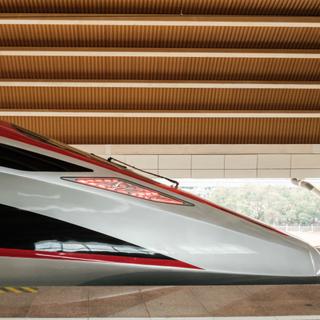


Full steam ahead for China's Belt and Road Initiative in Indonesia
NewsUnder the impetus of its president, Joko Widodo, Indonesia has embraced the Belt and Road Initiative project, attracting a record amount of Chinese investment. Meanwhile, Beijing is counting on the vast archipelago to expand its influence in the Indo-Pacific region.
They came with their families, their partners or their friends to try out Whoosh, Southeast Asia's first high-speed train, which now links Indonesia's capital Jakarta to Bandung in just 40 minutes – compared to three hours previously. Unable to get a spot, Januar, a 32-year-old nurse, was happy just to admire the train's svelte form from the platform. It can reach 352 kilometers per hour and is free for the first two weeks for those lucky enough to register in time. "I like speed; it's great to have this in our country," he said. The inauguration of China's first high-speed train outside China on October 2 took place 10 years after a historic speech made by Chinese President Xi Jinping to the Jakarta parliament. In this speech, the new leader launched his "Maritime Silk Roads" project, one month after revealing his grand plan for "land routes" beyond China's borders.
For Indonesian President Joko Widodo, who was elected the year after on the promise of providing his country with modern infrastructure, China seemed a providential partner. In 10 years and two successive mandates, Wikodo has been given the nickname "Jokowi" but also "Bapak Infrastruktur" ("Mr. Infrastructure"). He has turned the immense archipelago into a standard-bearer of China's strategic, economic expansion mission, since renamed the Belt and Road Initiative (BRI) and whose third summit has just been held in Beijing on October 17 and 18.
Over the past decade, a host of projects have emerged in Indonesia, particularly in the energy sector, such as the hydroelectric power station on the Kayan River in Borneo, and the industrial parks focused on the nickel industry and its derivatives in Sulawesi (formerly Celebes) and the Moluccas. Additionally, there is the Digital Silk Road Initiative driven by Chinese telecommunications and internet giants Huawei and Alibaba. They all contribute to creating a "community with a shared future for mankind" advocated by Xi, without the need to navigate the intricacies of what is seen as Western development aid, considered nitpicky and neo-colonialist.
'Bandung 2.0'
Indeed, it's no coincidence that Whoosh – whose name, Widodo explained, "was inspired by the sound this train makes as it speeds along" – ends its journey in Bandung. The city has a strong political resonance. It was in this former Dutch colonial city, now the "capital of Asia-Africa," that the non-aligned states met on April 18, 1955, at the initiative of China and Indonesia. Today, a sort of "Bandung 2.0" is taking shape, bolstered by the Indonesian public's fascination with China's technological achievements. They are, however, indifferent to the darker side of Chinese authoritarianism, and quick to label the United States as imperialist and Islamophobic.
You have 85% of this article left to read. The rest is for subscribers only.
